After years of coaching hundreds of people, emotional eating is more common than most think. When we experience negative emotions, such as stress, boredom, or sadness, many often turn to food for comfort. It lights ups the pleasure centers of our brains and rewards us with dopamine and good feelings. However, this can lead to overeating and weight gain, which can make us feel even worse in the long run. Mindful eating is a wonderful practice that can help us develop a healthier relationship with food and overcome emotional eating habits.
Mindful eating involves paying attention to the present moment, using all of our senses to experience food fully. This means taking the time to smell, taste, and savor each bite, and being fully present while eating, without distractions. By slowing down and paying attention to our body’s signals, we can become more aware of our hunger and fullness cues, and make healthier choices about what and how much we eat.
Here are some tips and strategies for incorporating mindfulness into your eating habits:
- Practice Self-Compassion: Emotional eating can often stem from feelings of shame or guilt about our eating habits. Mindful eating involves cultivating a sense of self-compassion and kindness towards ourselves. This means acknowledging that emotional eating is a normal and understandable response to stress or difficult emotions, and treating ourselves with gentleness and understanding.
- Identify Emotional Triggers: Mindful eating involves being aware of our emotional triggers for overeating, such as stress, boredom, or loneliness. By identifying these triggers, we can develop strategies for coping with them in healthier ways, such as going for a walk, calling a friend, or practicing relaxation techniques.
- Focus on the Experience of Eating: Mindful eating involves paying attention to the sensory experience of eating, such as the taste, texture, and aroma of food. This means avoiding distractions, such as television or electronic devices, while eating, and taking the time to savor each bite.
- Practice Mindful Portion Control: Mindful eating involves being aware of our hunger and fullness cues, and stopping eating when we feel satisfied, rather than full. This means taking smaller portions, eating slowly, and tuning in to our body’s signals of hunger and fullness.
At the heart of mindful eating is re-defining how we relate to food and how we self sooth ourselves. Our own experiences are our best medicine but not just that, it is what we cultivate in all of them. By being fully present while eating and paying attention to your body’s signals, you can make healthier choices, enjoy food in a more satisfying way and redefine how you relate to food and your own ability to sooth yourself.
I am love. I am joy. I am good.
*If you are interested in my custom diets and exercise programs click on the link below or in my bio Evolve with Tad the Diet Coach and check out what I offer. There are also mindfulness meditation and mindset work that I include as well!
If you wish to understand the full breadth of how I can help you, just click the link below or in my bio and set up a free discovery call with me and let’s talk!
https://linktr.ee/tadthedietcoach
https://calendly.com/tadthedietcoach/45-minutes
*Join my mailing list! Just text: TAD to 42828

